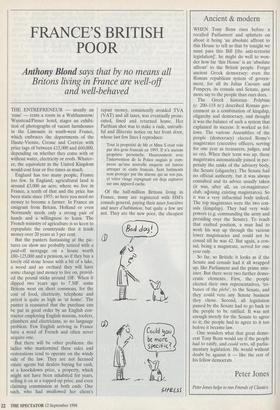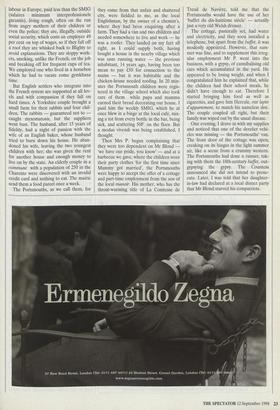FRANCE'S BRITISH POOR
Anthony Blond says that by no means all Britons living in France are well-off and well-behaved THE ENTREPRENEUR — usually an 'euse' — rents a room in a Walthamstow/ Wanstead/Pinner hotel, stages an exhibi- tion of photographs of vacant farmhouses in the Limousin in south-west France, which embraces the departments of the Haute-Vienne, Creuse and Correze with price tags of between £15,000 and £60,000, depending on whether they come with or without water, electricity or roofs. Whatev- er, the equivalent in the United Kingdom would cost four or five times as much.
England has too many people, France too few. In England, agricultural land is around £3,000 an acre, where we live in France, a tenth of that and the price has been static since 1955; so here you need no money to become a farmer. In France an emigrant from Britain, Holland or even Normandy needs only a strong pair of hands and a willingness to learn. The French ministry of agriculture is so keen to repopulate the countryside that it lends money over 20 years at 3 per cent.
But the punters fantasising at the pic- tures on show are probably retired with a paid-off mortgage on a house worth £80-125,000 and a pension, so if they buy a lovely old stone house with a bit of a lake, a wood and an orchard they will have some change and money to live on, provid- ed the pound sticks around 10F. When it dipped two years ago to 7.30F. some Britons went on short commons, for the cost of food, electricity, telephone and petrol is quite as high as 'at home'. The punter is reassured that the purchase can be put in good order by an English con- tractor employing English masons, roofers, plumbers and electricians, so no language problem. Few English arriving in France have a word of French and often never acquire one.
But there will be other problems: the ladies who mastermind these sales and restorations tend to operate on the windy side of the law. They are not licensed estate agents but dealers buying for cash, at a knockdown price, a property, which might not have been inhabited for years, selling it on at a topped-up price, and even claiming commission at both ends. One such, who had swallowed her client's repair money, consistently avoided TVA (VAT) and all taxes, was eventually prose- cuted, fined and returned home. Her Parthian shot was to stake a rude, untruth- ful and illiterate notice on her front door, whose last few lines I reproduce: Tout la propriete de Mr et Mme S etait vole par des gens francais en 1993. Il n'a aucune propriete personelle. Heuresement avec l'intervention de la Police ang,lais je com- prens qu'une nouvelle enquete est lancee attraper ce cunts francais. Sent batiments sont proteger par the alarme qui ne son pas, et votre visage repugnant est deja capturee sur une appareil cache.
Of the half-million Britons living in France, many are registered with HM's consuls general, paying their taxes foncieres and taxes d'habitation, but quite a few are not. They are the new poor, the cheapest labour in Europe, paid less than the SMIG (salaires minimum interprofessionels garantis), -living rough, often on the run from angry mothers of their children or even the police; they are, illegally, outside social security, which costs an employer 49 per cent on top of wages, so if they fall off a roof they are whisked back to Blighty to avoid explanations. They are sloppy work- ers, smoking, unlike the French, on the job and breaking off for frequent cups of tea. We employed one who lived in a horsebox which he had to vacate come gymkhana time.
But English settlers who integrate into the French system are supported at all lev- els and with compassion if they fall on hard times. A Yorkshire couple brought a small farm for their rabbits and four chil- dren. The rabbits — guaranteed not to — caught myxomatosis, but the suppliers went bust. The husband, after 15 years of fidelity, had a night of passion with the wife of an English baker, whose husband tried to burn down his house. He aban- doned his wife, leaving the two youngest children with her; she was given the rent for another house and enough money to live on by the state. An elderly couple in a commune with a population of 250 in the Charente were discovered with an invalid credit card and nothing to eat. The mairie send them a food parcel once a week.
The Portsmouths, as we call them, for they came from that unfair and shattered city, were fielded to me, as the local Englishman, by the owner of a chemist's, where they had been enquiring after a farm. They had a van and two children and needed somewhere to live and work — he was a roofer. They landed on my feet all right, as I could supply both, having bought a house in the nearby village which was sans running water — the previous inhabitant, 14 years ago, having been too mean to pay £50 for connection to the mains — but it was habitable and the chicken-house needed roofing. In 20 min- utes the Portsmouth children were regis- tered in the village school which also took care of them while papa and mamma earned their bread decorating our house. I paid him the weekly SMIG, which he at once blew in a binge at the local café, mix- ing a tot from every bottle in the bar, being sick, and scattering 50F. on the floor. But a modus vivendi was being established, I thought.
Then Mrs P. began complaining that they were too dependent on Mr Blond — 'we have our pride, you know' — and at a barbecue we gave, where the children wore their party clothes 'for the first time since Mummy got married', the Portsmouths were happy to accept the offer of a cottage and part-time employment from the son of the local manoir. His mother, who has the throat-warming title of La Comtesse de Treuil de Naviere, told me that the Portsmouths would have the use of her 'buffet du dix-huitieme siècle' — actually just a very old Welsh dresser.
The cottage, pastorally set, had water and electricity, and they soon installed a telephone, but apart from the buffet, it was modestly appointed. However, that sum- mer was fine, and to supplement this irreg- ular employment Mr P. went into the business, with a gypsy, of cannibalising old cars which accumulated in the yard. He appeared to be losing weight, and when I congratulated him he explained that, while the children had their school meals, he didn't have enough to eat. Therefore I started bringing him food as well as cigarettes, and gave him Hercule, our lapin d'appartement, to match his nameless doe. The couple coupled all right, but their family was wiped out by the usual disease.
One evening, I drove in with my supplies and noticed that one of the derelict vehi- cles was missing — the Portsmouths' van. The front door of the cottage was open, creaking on its hinges in the light summer air, like a scene from a crummy western. The Portsmouths had done a runner, tak- ing with them the 18th-century buffet, out- gypsying the gypsy. The Countess announced she did not intend to prose- cute. Later, I was told that her daughter- in-law had declared at a local dinner party that Mr Blond starved his compatriots.



































































 Previous page
Previous page